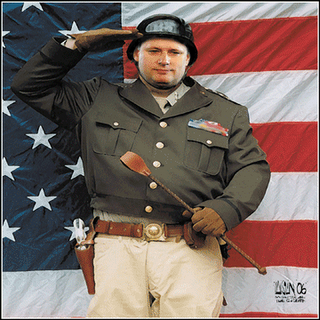
With friends and endorsers like this who needs enemies.
See: Werner Patels
Find blog posts, photos, events and more off-site about:
Dinning, Conservatives, Alberta, Leadership, PC, Klein, Premier, Patels
It’s possible that I shall make an ass of myself. But in that case one can always get out of it with a little dialectic. I have, of course, so worded my proposition as to be right either way (K.Marx, Letter to F.Engels on the Indian Mutiny)

"This isn't a meeting about how much more money the government of Canada is going to transfer to the provinces," Flaherty declared before he sat down for a working dinner in this picturesque tourist town. "It's not just about money."Provinces squabble with Ottawa, each other before fiscal imbalance meeting
"In practice, the Conservative approach would mean paring back Ottawa's role to concentrate mainly on defence, security and foreign affairs while leaving social programs and health care to provincial governments. The implications for Canadians are far-reaching, says University of Ottawa historian Michael Behiels. "Underlying Harper's moves here is a fundamental restructuring of the way the federation has operated for the last 50 years."Ottawa's fiscal finger of fate
To allow the provinces to fully fund healthcare, education, etc. will simply shift
the burden to a more localized tax base, while NOT reducing federal taxes one iota.
It will however allow the Conservatives to shift those taxes where they always do, law and order and more military spending.
A clear contradiction for those on the right who claim that they are both Conservative and libertarian.
The Haprocrite Conservatives are neither, nor are they Godwinians , so called minarchists, despite their claims to believe in smaller government.
They are statists whose State is not reduced in size, but militarized, a police state by any other name. This has been the agenda of the right since Reagan and Thatcher. Actually there is nothing new about this right wing agenda, and it ain't the New Right of Murray Rothbard either,it is the same as it has always been historically.


Jack Aylward, Ed.D.
The Contributions of Paul Goodman to the Clinical, Social and Political Implications of Boundary Disturbances
As we approach the millennium, we continue to grapple with
increasingly toxic threats such as environmental pollution, political
tyranny, and corporate domination of the human spirit. Currently, we
are witnessing the development of a health-care delivery system that not
only threatens our professional identities, but ultimately could create a
repressive definition of mental health that replicates the one against
which Perls, Hefferline, and Goodman originally rebelled. Gestalt therapy
theory places importance on creativity, novelty, spontaneity, and
risk in a society that is moving ever closer to repetition, obedience, and
the illusion of security. To meet the challenges, we need not say or do
anything new but simply restate (perhaps more loudly) what is already
present in our literature. To do so, it is imperative that we once again
apply our theoretical model to sociopolitical issues and realities that
contribute to the individual boundary disturbances we deal with in our
psychotherapeutic practices. In this spirit we will sequentially review: (1)
the theoretical and clinical definitions of contact boundary phenomena,
(2) the social nature of self-functioning, and (3) the political implications
in the writings of Paul Goodman.
Given a psychological model that views the individual as innately
healthy and capable, with pathology as a secondary disruption of an
otherwise natural homeostatic equilibrium, Goodman's anarchistic
philosophy is especially resonant with Gestalt therapy theory. This
connection between philosophy and therapy is not unlike Erich Frornrn's
belief in Marxist socialism. For him this philosophy "meant a society
which provides the material basis for the full development of the
individual, for the unfolding of all his human powers, for his full
independence" (Fromm, 1956, p. xiv). In both Fromm and Goodman we
see the belief that society should provide the support for an individual
who is and can be much, rather than one who has much. Optimally,
Goodman envisioned a dynamic unity of human need and social
support, implying as McLeod (1993) does that "the natural hierarchy of
needs arising to seek their fulfillment in the contact that is our very self
means Gestalt is a profoundly social therapy, envisioning and declaring
the naturalness of social and environmental harmony" (p. 28).
In subsequent essays and articles, Goodman focused on political realities
and how such phenomena affected contact boundary functioning.
Far from a utopian view Goodman's view of formal governmental
bureaucracy was that less was more with respect to social and political
structure and its impact on the quality of individual life. Susan Sontag
(1988) described Goodman's social outlook as "a form of conservative
humanistic thinking-doggedly sensitive to everything repressive and
mean while remaining loyal to the limits that protect human growth and
pleasure" (p. xvii). In this sense, Goodman saw that contact boundary
disturbances emanating from repressive and overly developed social
organizations have the potential to sap the spontaneity from human
functioning. Goodman (1994) stated that "society with a big S can do
very little for people except to be tolerable, so they can go on about the
more important business of life" (p. 53). Given that human selfhood was
primarily a social process supported by communication within a community,
political structures were realities needing to be reckoned with.
Mead's conceptualization of self-functioning parallels Goodman's
thinking in this area:
the "I" requires that we protect the rights and freedoms of individuals
as extolled by liberalism, while the "ME" imposes those moral
duties, commitments, and obligations advocated by cornrnunitarianism
[Odin, 1996, p. 371.
Much of Goodman's thinking was influenced by his association with
communitarian philosophers such as Randolph Bourne, Van Wyk
Brooks, and Lewis Murnford. Along with these dissenters within the
progressive intelligentsia of the time who were disappointed in contemporary
liberalism, Goodman was wary of the alienation resulting from
the bureaucracies of advanced industrialism. He, along with Dwight
Macdonald, Dorothy Dey, and C. Wright Mills, supported Brooks's ideal
of "the crafted or interactive self, which found its autonomy by participating
in a public world of culture and experience" (Blake, 1990, p. 141).
Consistent with the process functioning of self-formation in Gestalt therapy
theory, Brooks saw the "crafted self" as a kind of conversation with
the social and natural environments. Social and political realities
provided an ongoing ground for the alienation/identification processes
of contact functioning. In Confusion and Disorder" (197%) Goodman
outlined the potential impact that social structure can have on human
distress.
But if advanced peoples have indeed been colonized by their own
advances, they are confused and have lost their ability to pick and
choose what they can assimilate. We certainly manifest a remarkable
rigidity in our social institutions, an inability to make inventive
pragmatic adjustment. And perhaps worse, the sociology and politics
that we do think up have the same technological, centralizing,
and urban style that is causing our derangement [p. 2351.
The importance Goodman placed on organismic self-regulation and
social functioning also reflected the political thinking of such anarchists
as Mikhail Bakunin and Prince Peter Kropotkin. To Goodman, anarchy
epitomized the absence of authority, not the absence of order. In his
introduction to Kropotkin's Memoirs of a Revolutionist Goodman (1968)
points out the potential for disruptive contact functioning that can result
from an overly organized and impersonal political structure:
The real enemies have proved to be the State (whose health is war),
over-centralized organization, the authoritarian personality of
people. The call is for grass-roots social structures, spontaneity and
mutual aid, direct action and doing it yourself, education for selfreliance
and agitation for freedom [p. xxi].
Goodman was sensitive to the dehumanization of the industrial
revolution, to the accompanying division of labor and, to anything that
smacked of tyranny over someone else's body. Like other anarchist
thinkers, Goodman was fanatic in his defense of the untrammeled person
whom he felt to be best nurtured by an innovative way of life and a
nonrepressive political doctrine.
In Anarchism and Revolution (1977) he wrote:
In anarchist theory, the word revolution means the process by which
the grip of authority is loosed, so that the functions of life can
regulate themselves without top-down direction or external
hindrance. The idea is that except for emergencies and a few special
cases, free functioning will find its own right structures and coordination
[p. 2151.

What follows is a thoughtful letter from union member John Gilmurray:The real problem with labour policy in Canada is the union "local" system. On a recent visit to England and Ireland I was surprised that there are no locals, just one trade union congress for each country.
Everybody is hired directly by a construction company based on their resume. There are no grandfather clauses, no middle-aged white guys hanging around a union hall dishing out jobs to friends. Supply and demand are the rule. Thousands in Dublin have vacated jobs as teachers and bank clerks to become carpenters and electricians. No wonder they have one of the the best economies in the world.
